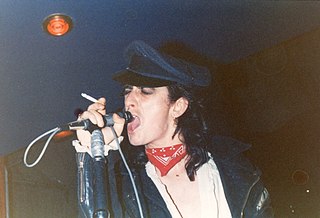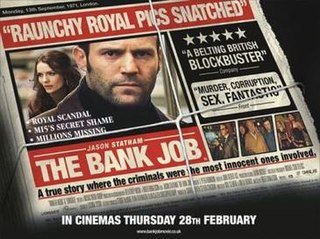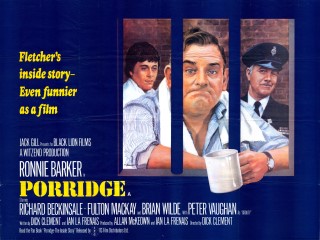Cockney is a dialect of the English language, mainly spoken in London and its environs, particularly by Londoners with working-class and lower middle-class roots. The term Cockney is also used as a demonym for a person from the East End, or, traditionally, born within earshot of Bow Bells.

Porridge is a British sitcom, starring Ronnie Barker and Richard Beckinsale, written by Dick Clement and Ian La Frenais, and broadcast on BBC1 from 1974 to 1977. The programme ran for three series and two Christmas specials. A feature film of the same name based on the series was released in 1979.

Ian David McShane is an English actor. He is known for his television performances, particularly as the title role in the BBC series Lovejoy (1986–1994), Al Swearengen in Deadwood (2004–2006) and its 2019 film continuation, as well as Mr. Wednesday in American Gods (2017–2021). For the original series of Deadwood, McShane won the Golden Globe Award for Best Actor – Television Series Drama and received a nomination for the Primetime Emmy Award for Outstanding Lead Actor in a Drama Series. For the film, he was nominated for the Primetime Emmy Award for Outstanding Television Movie.
Dick Clement is an English writer, director and producer. He became known for his writing partnership with Ian La Frenais for television series including The Likely Lads, Whatever Happened to the Likely Lads?, Porridge, Lovejoy and Auf Wiedersehen, Pet.
Ian La Frenais is an English writer best known for his creative partnership with Dick Clement. They are most famous for television series including The Likely Lads, Whatever Happened to the Likely Lads?, Porridge and its sequel Going Straight, Lovejoy and Auf Wiedersehen, Pet.

Sir William Stanley Baker was a Welsh actor and film producer. Known for his rugged appearance and intense, grounded screen persona, he was one of the top British male film stars of the late 1950s, and later a producer.

Water is a 1985 British comedy film directed by Dick Clement and starring Michael Caine. It was scripted by Clement and Ian La Frenais. The plot spoofs elements of the comedies Carlton-Browne of the F.O. (1958) and Passport to Pimlico (1948) and the then-recent invasions of the Falkland Islands and Grenada. Caine plays Baxter Thwaites, a Governor who has 'gone native', and Billy Connolly as local biracial activist Delgado, supported by the last performance of Leonard Rossiter, as Sir Malcolm Leveridge, and one of the last performances of Fulton Mackay.

Gary Frederick Holton was a British singer-songwriter, musician and actor from London. He was the frontman of the band Heavy Metal Kids (1972–1977), worked with Casino Steel (1981–1984), and played the part of Wayne in the UK television comedy Auf Wiedersehen, Pet (1983–1985). Holton died from an overdose of morphine combined with alcohol in 1985.

Alfredo Lettieri was an American actor. Active during the 1960s and 1970s, he commonly portrayed villainous characters. He achieved recognition for his performance as mobster Virgil Sollozzo in the crime film The Godfather (1972) and appeared in several other productions alongside Hollywood's biggest screen stars.
Craig John Fairbrass is an English actor, producer, and screenwriter. He has made appearances in London's Burning (1990), Cliffhanger (1993), Killing Time (1998), EastEnders (1999–2001), The Great Dome Robbery (2002), The Long Weekend (2005), Rise of the Footsoldier film series (2007–present), The Bank Job (2008), House of the Rising Sun (2011), St George's Day (2012), Breakdown (2014), The Hooligan Factory (2014), Villain (2020),

The Bank Job is a 2008 heist thriller film directed by Roger Donaldson and written by Dick Clement and Ian La Frenais. It is based on the 1971 burglary of Lloyds Bank safety deposit boxes in Baker Street. It stars Jason Statham.
Michael John Tuchner was a British film and theatre director.
Coast to Coast is a 1987 comedy thriller starring Lenny Henry, John Shea, with support from Peter Vaughan, Pete Postlethwaite, Cherie Lunghi ,Edward Peel,Tony Haygarth,Bobby Knutt and Al Matthews. It was directed by Sandy Johnson from a script by Stan Hey. It featured a soundtrack of classic Motown tracks. It was originally screened as part of BBC2's Screen Two strand in January 1987. The film had its to-date only cinema screening at BFI Southbank, in December 2016 as part of the BFI's retrospective of Henry's career.

Porridge is a 1979 British comedy film based on the television series Porridge. It was released under the title Doing Time in the United States. Most of Prison Officers and inmates from the original series appear in the film, with the notable exceptions of Lukewarm, Blanco, Heslop and Harris. There is also a different governor, played by Geoffrey Bayldon rather than series regular Michael Barrington.

Allan John McKeown was a British television and stage producer.

Danger Ahead is a 1935 American crime drama film directed by Albert Herman, produced and released by Victory Pictures Corporation.
Freddie Foreman is an English publican, gangster, former associate of the Kray twins and convicted criminal.

Cockneys vs Zombies is a 2012 British zombie action comedy film directed by Matthias Hoene and written by James Moran and Lucas Roche. The plot centres on a group of Cockneys who arm themselves to rescue their grandfather and his friends from their retirement home as a zombie apocalypse takes place in the East End of London.

Porridge is a British television sitcom, starring Kevin Bishop, written by Dick Clement and Ian La Frenais, and broadcast on BBC One. The show is a sequel to the original 1974 series of the same name, which both Clement and La Frenais wrote. The sitcom focuses on prison inmate, Nigel Norman Fletcher, the grandson of Norman Stanley Fletcher, who is sent to Wakeley Prison to serve a five year sentence for cyber crimes.

The Burden of Proof is a 1968 crime novel by the British writer James Barlow.













